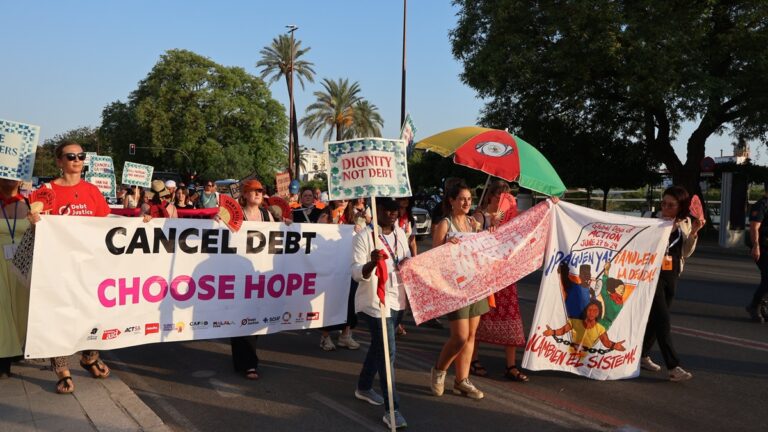Latin America Spends Three Times More on Debt Than Health

X/ @latindadd
July 2, 2025 Hour: 9:18 am
Latindadd, a coalition of 31 organizations from 14 countries, is demanding an urgent reform of the global financial system.
On Wednesday, Nathalie Beghin, co-chair of the Latin American and Caribbean Network for Economic, Social and Climate Justice (Latindadd) criticized how Latin America allocates three times more money to external debt payments than to health investments and twice as much as its education budget.
RELATED:
Argentina Acquires a Huge Debt With the IMF to ‘Calm the Market’, Caputo Acknowledges
Latindadd, a coalition of 31 organizations from 14 countries, is demanding an urgent reform of the global financial system. At a news conference during the 4th International Conference on Financing for Development in Seville, Beghin stressed that the current economic system “chokes Global South countries.”
In 2024, at least 35% of these nations’ revenue went toward debt payments, “which blocks state capacities to guarantee basic rights,” she said, noting that current negotiations “remain conditioned by the interests of major powers and exclusive financial governance mechanisms.”
As evidence of a “structurally unjust system,” she pointed out that 70.7% of debt is held by private creditors with interest rates up to 8.5 times higher than those faced by Global North economies.
Patricia Miranda, Latindadd’s global advocacy director, warned that multilateralism “is at stake,” arguing that global decisions can no longer be made “within structures dominated by a few.” Instead, she called for “a financial architecture where every country has an equal voice.”
To address this, Latindadd is pushing for a U.N. Framework Convention on Sovereign Debt to ensure fair, transparent crisis resolution with public participation. The Sevilla conference also addressed the climate crisis, criticizing the disconnect between climate rhetoric and actual funding mechanisms.
“Latin America and other Global South regions need nearly US$6 trillion by 2030 to meet climate commitments,” said Carola Mejia, Latindadd’s climate justice coordinator. She noted that in 2022, 81% of climate financing came as debt, primarily through the World Bank and Inter-American Development Bank.
“This isn’t fair climate finance—it’s more financial burden,” Mejia said, condemning the European Union for obstructing systemic reform. She demanded “a roadmap based on global justice,” stressing that “this isn’t about charity or aid, but recognizing the Global North’s historic debt to the South.”
teleSUR/ JF
Source: EFE

